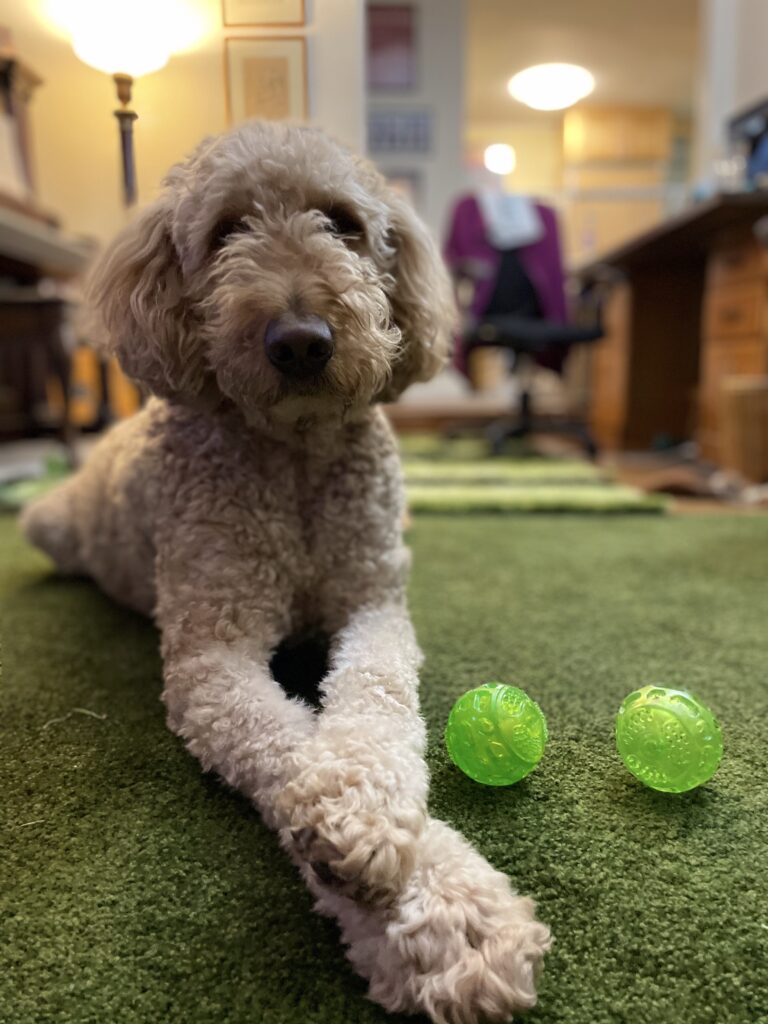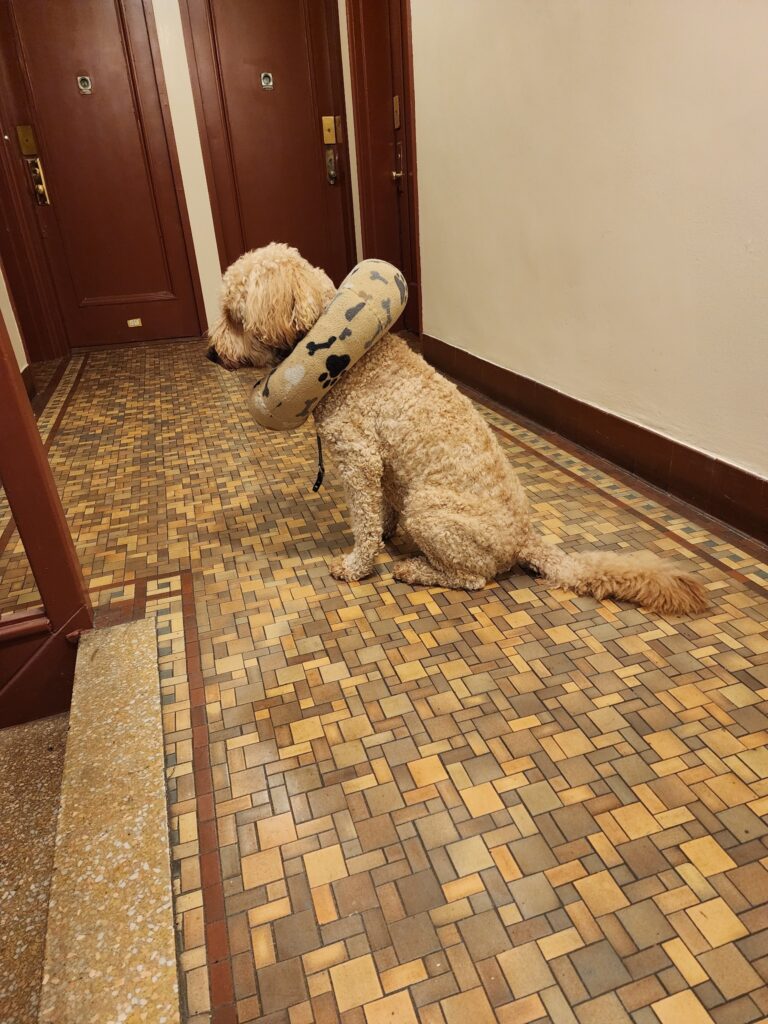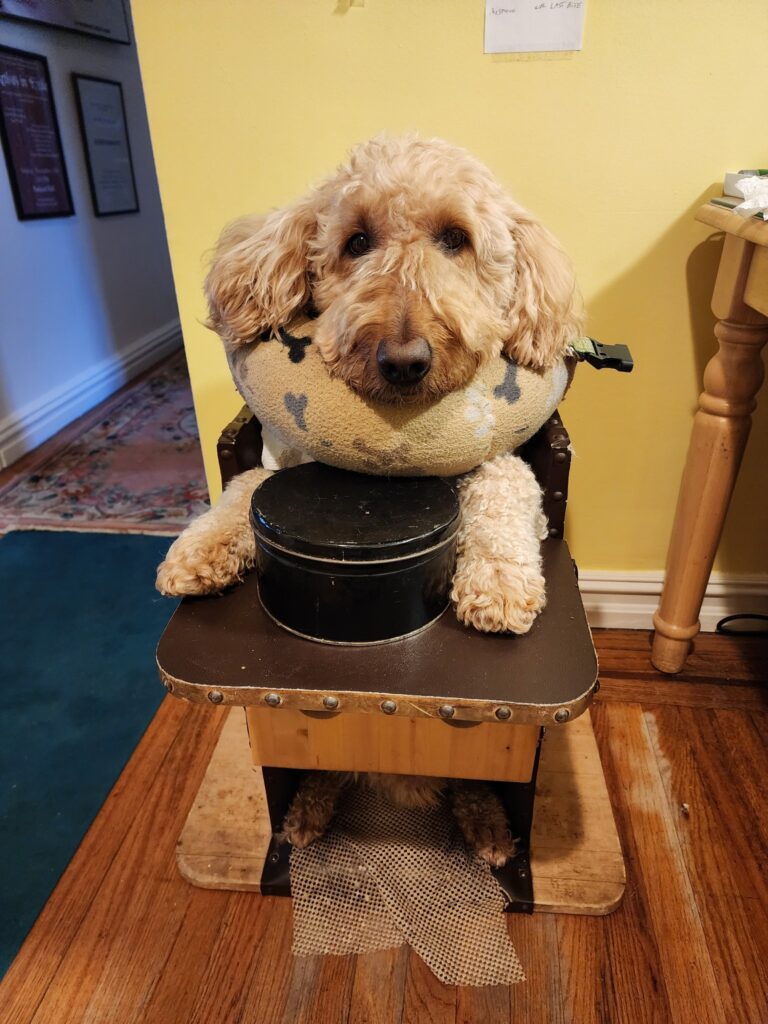Teddy died last Sunday after a short, swift illness, probably cancer. He was eleven years old.
My seminal Teddy memory: in the kitchen, during his early adulthood, I off-handedly said: “Mommy’s coming.” Teddy quivered with an anticipatory elation that consumed every particle of his being. This was my first experience of his bewildering linguistic acumen, and of an unadulterated emotional vocabulary that would never cease to surprise and amaze.
Much more recently – about a year ago – I informed my wife Agnes that the elevator was broken again and Teddy would have to take the stairs. This information was not imparted to Teddy. But, as was so often the case, Teddy was listening. When I leashed him and opened the front door to our apartment, he proceeded not to the elevator but to the stairs and began to whimper – he hated the stairs, his paws would slip and slide going up and down. The next day I told Teddy “The elevator is fixed” and he was a happy dog.
Teddy was good friends with Neil and Diane down the hall. Early in this relationship, I informed Agnes that Teddy knew we were about to pay them a visit; he had heard us talking about it. Agnes was skeptical. “Go and look,” I suggested. Agnes poked her head out the door and observed Teddy parked on his haunches in front of 6D. “Speak,” I said. He barked, the door opened, and Teddy entered wagging his tail.
The imagery of Teddy anticipating a visit was repeated many times. We acquired a self-serving habit of informing Teddy of impending “surprises.” The biggest announcements were that Bernie or Maggie – our son and daughter – were arriving. Teddy would position himself downstairs in the lobby, tautly immobilized. His suppressed energy would detonate once Bernie or Maggie appeared. We eventually conceded that we were exploiting his loyalty for our own pleasure. So we would strategize to keep Teddy in the dark – which proved impossible, because he eavesdropped even on phone conversations.
During the years that Agnes worked at Wadleigh High School on West 114 Street, Teddy and I would often meet her after work. Teddy would haul me to the bus stop at the corner of 96th and Central Park West and there inspect each arriving uptown bus. Or Teddy and I would walk 18 blocks to Wadleigh — he knew the way. It mattered not if Agnes was delayed. We sat on a stoop scrutinizing the schoolyard. Not once would Teddy look left or right.
Sometimes Agnes felt too tired or too busy to join us for Teddy’s early evening walk. Teddy would tenaciously object. Almost invariably, Agnes would change her mind.
When I took Teddy to Central Park, I chatted with him about one thing or another. However busy reconnoitering, Teddy would glance up to acknowledge my comments and instructions. In later years, he grew increasingly sociable. He took no interest in other dogs – or squirrels or horses, or the occasional raccoon, or the stray coyote we once saw at a distance. He could shrewdly assess which children and adults would likely succumb to his gaze. For many, it was irresistible. Can I pet your dog? What’s his name? May I say hello? Teddy would waylay passengers emerging from a car. He thought nothing of interrupting the cell phone conversations of strangers.
Of his friends on the block (typically with people whose names I never learned), the oldest and most intense was with Dino the night doorman four buildings down. Our midnight walks would begin with single instruction – “Let’s visit Dino” or (on Saturdays and Sundays) “no Dino.” Teddy accepted the finality of “no Dino” and would proceed across the street to pee. “Let’s visit Dino” meant waiting for Dino to appear and open a locked door. Sometimes Dino was not available and Teddy would cross the street with extreme reluctance. Dino’s wife once asked him: “Do you give him treats?” But Teddy’s friendships were never enticed – except by Teddy himself. When Teddy passed, Dino called him an “angel.” I owe my friendship with Dino to Teddy.
I haven’t mentioned that Teddy was born with a couple of serious medical disorders: myasthenia gravis and mega-esophagus. A miracle drug called mestinon kept him alive. But he could not swallow food or water normally. Like all myasthenia gravis dogs, he ate in a “Bailey chair” which kept his throat vertical.
So we hand-fed Teddy three times daily. The risk that Teddy would mis-swallow was ever present – we would have to pound his sides to help dislodge phlegm and errant food. We belonged to a diligent online community of MG dog owners. Bonding with a dog with special needs is itself a special experience.
Agnes and I never left Teddy alone. If we all travelled together, it was by car with Teddy and his chair; Teddy was far too large to pack on a plane. Last Monday, Agnes and I flew together for the first time in over a decade – to be with Maggie and Bernie in San Francisco. When we return to our New York apartment, we will return to Teddy’s chair, to Teddy’s beds, to Teddy’s medicines and toys and blankets and coats – to all things Teddy except Teddy himself.
His passing leaves an immense void.




I’m sorry Joe. This is very sad.
Dear Joe,
Thank you for sharing the touching story of Teddy. It arrives the morning after a Thanksgiving feast where I was extolling the virtues of poodles to a family whose daughters are bugging them to get a dog. Our family dog when I was a teenager was the poodle Titus, who had the same kind of perception as Teddy. He understood when my sister or I were ill or low, and consoled us by giving us more than our usual share of his attention.
Allow me to tell my favorite story about Titus, who was both smart and very well trained. My mother would get him a big bone from the butcher and the rule was that the bone had to stay in the kitchen on the linoleum floor, but not into the dining room where there was a rug. So, we are sitting at the kitchen table and Titus is chewing his bone with his hind quarters facing the dining room. Gradually he starts to skooch back toward the dining room, all the while checking out our response. He finally reached the point where his entire body was on the dining room rug, but the bone was still in the kitchen, and that became his bone-knawing location. He loved being on the rug, but adhered to the bone in the kitchen rule.
I know how much you miss Teddy and send you condolences on your loss of this important family member. (PS Titus learned phrases in French and German as we were trying to camouflage them because he learned the English phrases so quickly.)
Please let me know the next time you expect to come to Houston!
Michael Webster
What a beautiful tribute to an excellent dog! Teddy’s verbal intelligence was remarkable. I felt priviliged to meet him last summer during our week at Brevard Music Camp. Your observation about bonding with a dog with special needs resonates with my own experiences caring for three aging cats, Diego, Xander, and Arthur, who were all both great companions and great teachers of how to age well and live fully every day.
Dear Joe, this is truly sad. What you write is so moving. Because Teddy was so inviting and fun, I’m afraid I never learned to control myself properly when socializing with him- to everyone’s appropriate distress. As with any being who passes, there will be memories but no successor, -Steven
Dear Joe: Deep condolences on your loss. Our canine friends are such great teachers of so many vital lessons. I’m glad Teddy had you and your family as his pack for this mysterious earthly journey. Sincerely, Rick
Dear Joe, such a beautiful, loving tribute to a truly remarkable dog. Tom & I are so sorry for your loss. Sending love to you, Agnes, Bernie and Maggie.
It is a sad, so-moving essay written by you.
I’m with both of you in your grief. It will get easier in time, but you are right about the immense void. Love both of you very much. Wish I could help
Joe, Agnes, Maggie, Bernie,
I am so sorry for your loss. Teddy was a memorable part of the lives of my five children while we lived in New York. With every visit, he brought joy and happiness into our home and we are all very sad about his passing. The thing that struck me most about Teddy was his eyes–deep, soulful, connected, and caring. Teddy brought us great joy with every visit and he leaves us with beautiful memories. We will miss him very much. And we miss you too, my friends. God bless you.
Joe and Agnes, I am so very sorry to learn of Teddy’s passing. He was a large and friendly presence at the Brevard Music Center each summer for nearly a decade. Your devotion to him and your commitment to giving him a good life was obviously rewarded tenfold in the enjoyment, companionship, and true company he provided you and Agnes. I can only imagine the hole he leaves in your heart. We are sharing in your sadness.
Dear Joe, This essay on your family’s relationship to your very remarkable Teddy has the reasonableness, sensibility, learning, meticulous observation, and profound fellow feeling for another living individual that also distinguish your writings on musicians. It is humbling to read and heartening to contemplate. To you, Agnes, and the children, I’m so sorry for your loss yet also filled with admiration for how you have taken the time to open your lives to a creature with special needs. Clearly, he repaid you with his intelligence and his own sensibility many times over–and this story about him brings him alive for readers who never met the original.
Dear Joe, It is telling that a dog should finally move me to write you and convey how much you are missed in Washington. I adopted my first dog, a corgi named Einstein, two years ago, at the ripe old age of 80, and your moving description of Teddy mirrors our deep emotional attachment and sense of mystery about these wonderful creatures – .next to music, among the greatest gifts to mankind.
Keep writing, and all the best.
Ron Raphael (still enjoying PostClassical Ensemble)